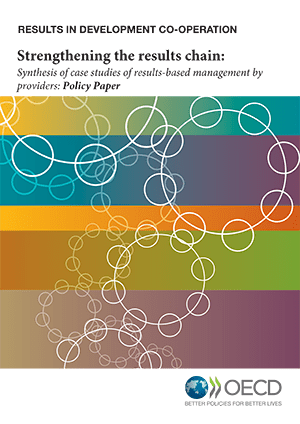Results-based approaches
How can a greater focus on results improve accountability, communication, direction and learning?
A policy paper and seven underlying case studies identify and document key themes, current challenges and good practice in results-based management by development co-operation providers.
Case studies of results-based management by providers
The ultimate goal for development co-operation providers is achievement of development outcomes and impact: real changes in the lives of beneficiaries in developing countries. Providers and their partners articulate the specific results they will achieve or contribute to in support of these development outcomes.
Results frameworks and results-oriented approaches spell out the means to generate and use results information at multiple levels and for multiple purposes, including accountability, communication, direction and learning.
Providers face six interrelated challenges in implementing their results-based management approaches:
- Goals: linking results to goals and building narratives
- Purpose: ensuring Results-Based Management approaches are fit for purpose
- Attribution: being realistic about attributing and aggregating results
- Ownership: enabling country ownership of results information
- Performance: linking results and performance to inform delivery
- Culture: enhancing resources to build a learning culture
Sharing good practice
Results-based approaches of development co-operation providers
- Corporate results frameworks
- Corporate Scorecards - World Bank Group, World Bank
- Strategic results framework, Thematic indicator sets - New Zealand Aid Programme
- Results communication
- Interactive results report - Netherlands Ministry of Foreign Affairs
- Capacity building
- Results-based management how-to guide - Global Affairs Canada
- Results-oriented policy dialogue (working document)- Swiss Development Co-operation
- Overview of the Program Cycle - USAID
- CLA Evidence Dashboard - USAID
- What Difference Does CLA make to Development? (5 page summary) - USAID
- Monitoring, Evaluation and CLA Toolkits - USAID
- Collection of CLA Case Studies from USAID staff and partner organizations (searchable by country and theme) - USAID
Insights from external reviews of results-based management approaches
- Evaluation of the Norwegian Aid Administration's Practice of Results-Based Management, Norad, 2018
- Results-Based Management in the United Nations System: Analysis of Progress and Policy Effectiveness-Summary Report, Joint Inspection Unit, United Nations, 2017
- Results-Based Management in the United Nations System: Analysis of Progress and Policy Effectiveness-Full Report, Joint Inspection Unit, United Nations, 2017
- Results-Based Management in the United Nations System: High Impact Model for Results-Based Management, Joint Inspection Unit, United Nations, 2017
- Independent Evaluation of SDC's Results-Based Management System with a Focus on Poverty Reduction, Swiss Agency for Development and Cooperation, 2017
- Review of Results-Based Management in the GEF, Independent Evaluation Office, Global Environment Facility, 2017
- Evidence Base For Collaborating, Learning And Adapting, USAID, 2017
- The politics of the results agenda in DFID: 1997-2017, Craig Valters and Brendan Whitty, ODI, 2017
- Results and Performance of the World Bank Group (RAP) 2016 Independent Evaluation Group (IEG), World Bank, Report, 2017
- Flexibility, Learning And Ownership: New Trends In Democracy Assistance, Results Management And Evaluation, Helena Bjuremalm, William Sjöstedt, IDEA, 2016
- Towards an alternative development management paradigm? Cathy Shutt, Expert Group for Aid Studies (EBA), Report, 2016
- Behind the Mirror: a report on the self-evaluation systems of the World Bank Group Independent Evaluation Group (IEG), World Bank, Report, 2016
- Evaluation: Finland’s Development Policy Programmes from a Results-Based Management Point of View 2003–2013, Finland Ministry of Foreign Affairs, 2015
- DFID’s approach to delivering impact Independent Commission for Aid Impact (ICAI), Report, 2015
- Boosting or hindering aid effectiveness? An assessment of systems for measuring agency results Sarah Holzapfel, German Development Institute (DIE), Discussion paper, 2014
Please share your good practice, evaluations and reviews of results by sending materials (as links) to: DAC.Results@oecd.org
